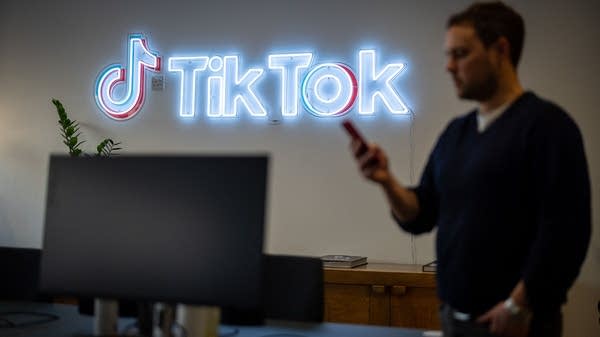Digital ad spending could take a hit from tariffs
Brands’ digital advertising budgets are often the first to get cut when the economic horizons look gloomy. That could spell trouble for tech companies.

Meta, the parent company of Facebook, Instagram and WhatsApp, beat analysts expectations in its earnings report after the bell Wednesday.
Revenue was up 16% in the first quarter for the social media giant, but it warned investors that it’s hard to predict where things are headed in 2025, in part because of Meta’s reliance on the tariff-sensitive advertising market.
Companies’ ad spending tends to track gross domestic product pretty closely, said marketing professor Koen Pauwels at Northeastern University.
“When they feel that there’s boom times, there’s lots of consumers with lots of demand and willingness to pay for their products,” he said. Companies are more willing to invest in getting those consumers’ attention.
But when the economic horizons look stormy?
“Marketing budgets are the first to go for many brands,” said Haley Ferrini, a tech analyst with Mintel.
She said that’s especially true for digital marketing, since companies can track an online ad’s performance in real time to see if it’s driving traffic.
“If a brand wants it paused it can be turned off, like, within the hour. So it’s a quick way to save some money,” she said.
And for some overseas companies, steep tariffs mean there’s no longer a market for their products in the U.S.
Chinese retailers Shein and Temu have reportedly already slashed spending on Google, Facebook and other major U.S. platforms that rely on those ad dollars.
“All of the largest tech companies, advertising contributes either virtually all of their revenue or a significant amount of their profits,” said Eric Haggstrom with the consulting firm Advertiser Perceptions.
For the last few years, tech companies have been using strong ad revenue to spend big on artificial intelligence advancements that could help them run more efficiently and attract users down the road, said Northeastern’s Koen Pauwels.
“So it does require a lot of investment but of course it also is supposed to save the company costs. That’s gonna be a very interesting dilemma that they face,” he said.
If the trade war leads to a sustained slowdown in digital marketing, Pauwels said we could see layoffs as tech giants are forced to reign in those investments.













